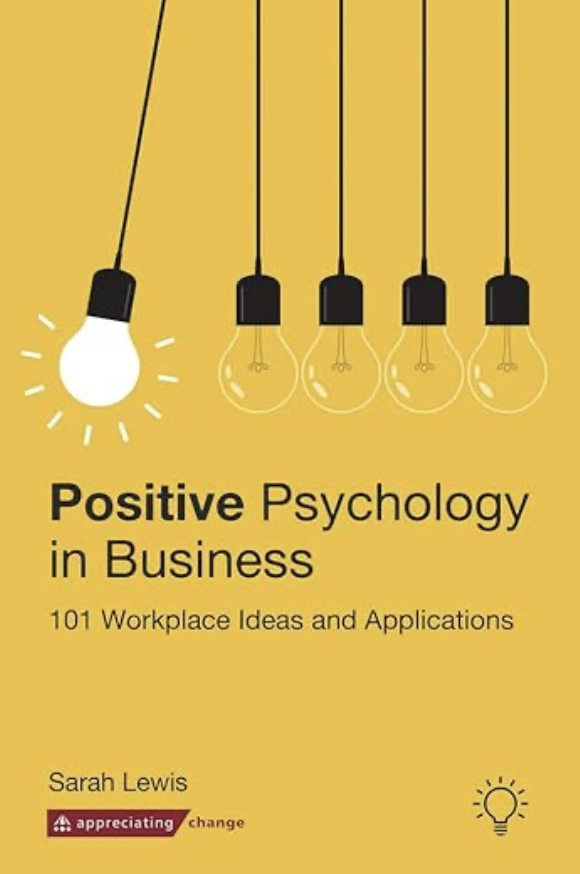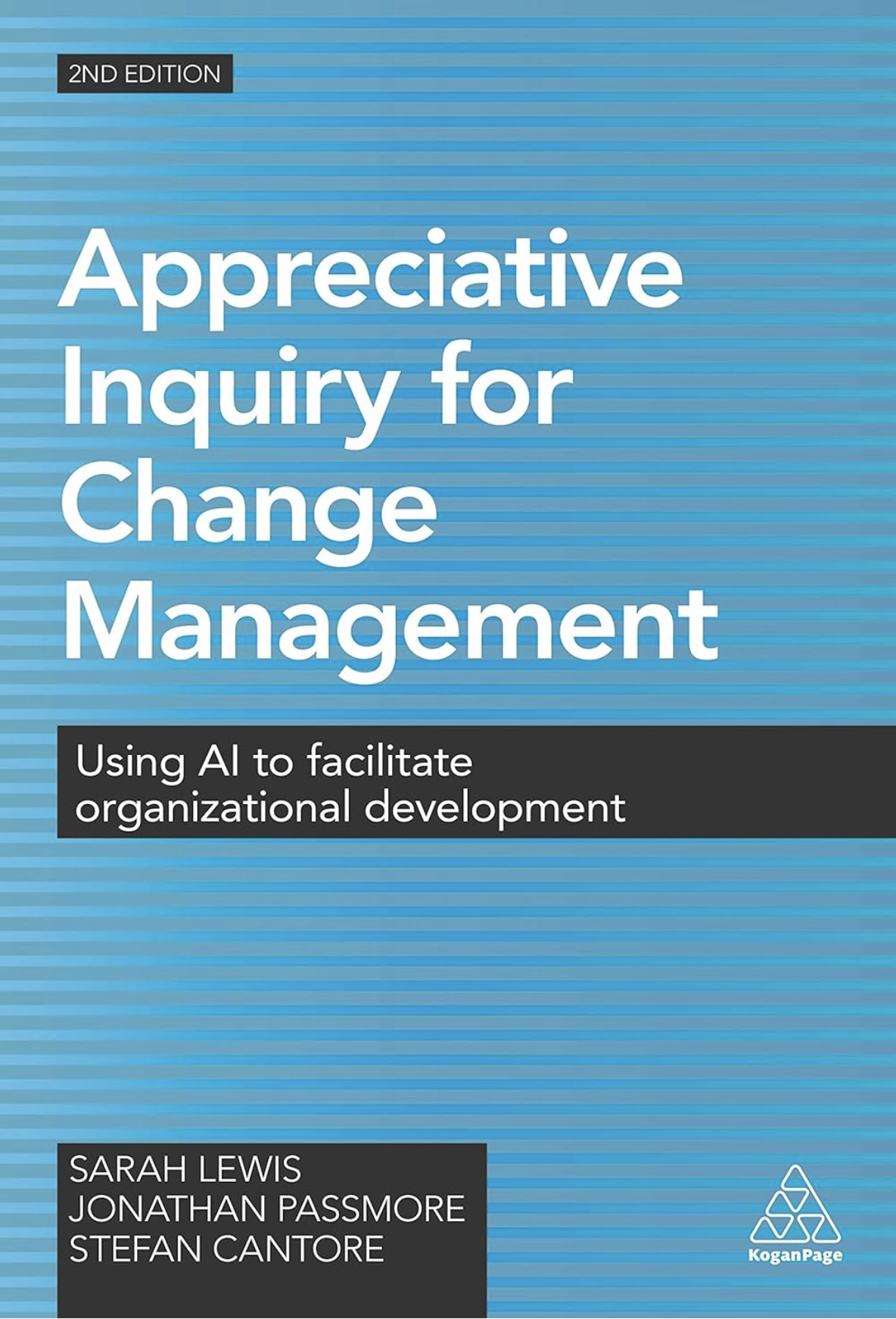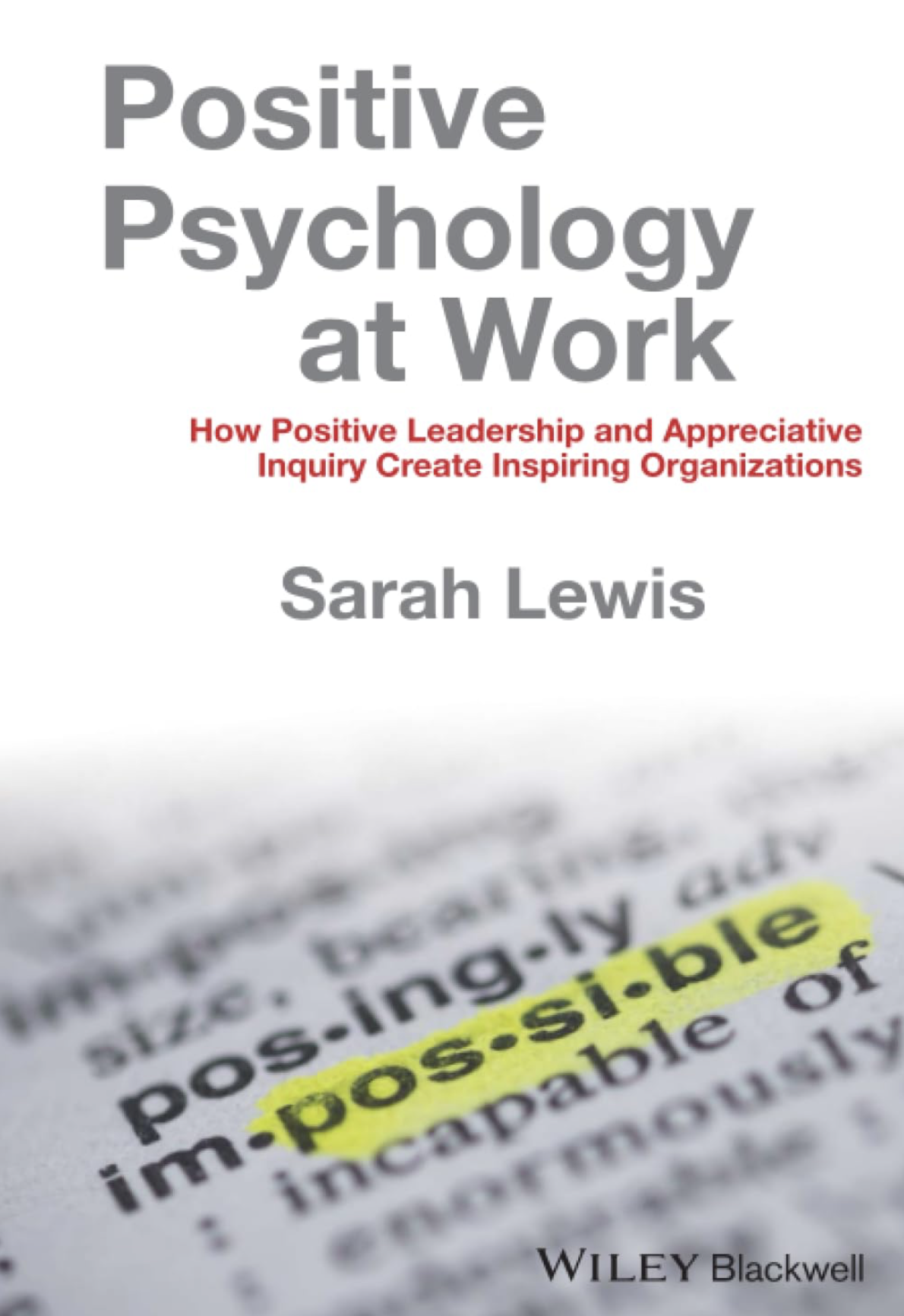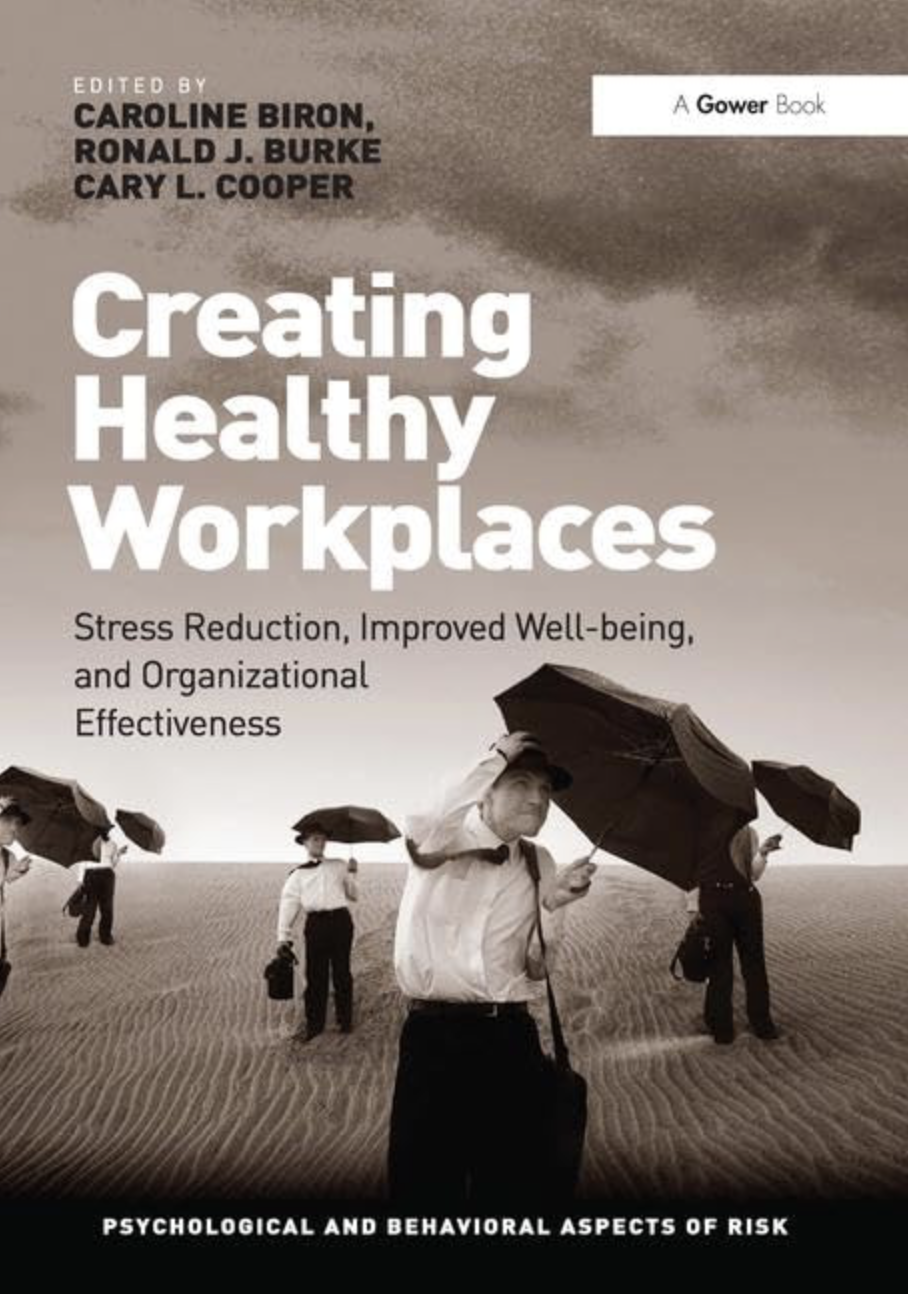Books by Sarah Lewis
Practical Appreciative Inquiry
Published January 2025
Amazon 5* rating
Praise for Practical Appreciative Inquiry
I loved this comprehensive and incredibly digestible overview of appreciative inquiry. It's informed by the author's expertise in positive psychology and 30 years' working with organisations. It includes fascinating, up to date research and practical guidance for applying appreciative inquiry in a range of different scenarios - she is generous and open with her own experience of putting these into practice too. Appreciative Inquiry is such a radical and powerful lens to look at the world through, and this book is the best I've read on what it can look and feel like on the ground
Amazon review UK
If you are keen to put Appreciative Inquiry at the heart of your practice and are interested in how it connects to current topics of organisational interest such as psychological safety, equality, diversity and inclusion and remote working, this could be the book for you.
Features and content of the book include
Clear account of the development of Appreciative Inquiry explaining how it relates to other disciplines such as dialogic organisational development
Presentation of the evidence base for, and the critiques of, Appreciative Inquiry
Clear explanation of the 5D model, the principles of practice, and key theoretical concepts such as narrative and sense-making
How Appreciative Inquiry helps with psychological safety and equality, diversity and inclusion
Guidance on how to create a commission
A series of chapters on the application of Appreciative Inquiry to
Leadership
Resilience
Project management
Innovation and creativity
Silo busting
Performance
Teams
Virtual and hybrid working
Evaluation
Planned change
Health and wellbeing
with case studies to illustrate.
Templates and illustrative material for practitioner use
A deconstructed case study to explore the application of appreciative inquiry in each of the topic chapters
This is the book for Appreciative Inquiry practitioners looking for guidance on how to extend their practice ability to many challenges of organisational life. With extensive footnotes it should also be useful to students and academics.
Co-creating Planning Teams For Dialogic OD: From Entry to Event
Published 2021
This short, lively book by seasoned Dialogic OD practitioner Sarah Lewis describes how the unfolding interactions with the change sponsor, internal change agent(s), and planning team lays the essential groundwork for successful large group Dialogic OD. In organizations that are used to top-down management, the planning team plays many roles, including:
Acting as a microcosm of the larger system that can bring the perspectives, issues, and concerns of the variety of stakeholders to the table
Creating a testing ground to understand the important norms, narratives, history, and present-day strengths and challenges that must be taken into account to design an effective change process
Bringing together the initial group with whom you learn how to develop enthusiasm for a Dialogic OD approach in the larger organization
Emboldening the people who are crucial in convincing senior managers and inviting the rest of the organization into a process of generative conversations that may be very counter-cultural
Sarah provides detailed descriptions of the many issues and group dynamics you are likely to face and appropriate responses to each of them. Supporting you as you enter the organization, gain the support of a key sponsor, set up a design team, and then help that team let go of traditional, problem-solving approaches to planned change and instead embrace a generative change approach. We follow a case of an experienced Dialogic OD practitioner beginning a new assignment for a leader who says he wants to create an empowering, engaging approach to dealing with people issues identified in a staff survey but doesn’t really understand what it takes.
We watch her work with an internal change-agent partner who has trouble letting go of mechanistic, bureaucratic processes, and a design team who initially assume their job is to provide solutions for managers to implement. Over a few months, a developmental process takes place as they test, challenge, learn and eventually become the core from which the entire organization gets ready to engage in generative change.
Praise For Co-creating Planning Teams For Dialogic OD
In this book Sarah Lewis answers all the questions most organisations forget to ask when implementing change. Who should be involved? How should we engage them? And, what is the process by which an organisation can design its own future? Anyone who is weary of having to justify ineffective change strategies will find this book refreshing and practical. It offers a step-by-step guide to implementing truly effective, authentic and sustainable organisational change - Dr Roger Bretherton, Associate Professor, School of Psychology, University of Lincoln
With clear explanations and an illuminating case study, this book takes us by the hand on the hardest part of a journey of transformation: the vital first steps towards doing something different. In a reader-friendly way she shows us missteps to avoid as well as pointing out key moments to watch out for, while giving stage-by-stage guidance on how to create a dialogic change planning team. If you know you know you need a different approach to change, but don't know how to get started, this is the book for you. - David Lewis, programme director and guest lecturer at the London Business School; author of 'What philosophy can teach you about being a better leader'.
Had a read and... love it. Seriously, I am not prone to language like that unless I mean it. I work with many internals, and this is a practical, pragmatic and useful book. It does that rare thing of weaving a number of interconnected and related ideas e.g. wicked problems, the nature of change (and mess) in human systems, power and politics, working with anxiety, Dialogic OD etc, and succeeds in weaving a narrative that is grounded and, crucially, accessible. There is no colluding with 'the magic of OD', rather this is a book that helps consultants and practitioners by both explaining and offering suggestions, steps and approaches they can experiment with, whilst building a compelling case for why many of these are not to be skipped over. It takes some of the gnarliest challenges and offers suggestions that are eminently practical that you can play with, and in a way that does not discount the difficulties involved. - Steve Hearsum, Co-chair ODN Europe.
As always, Sarah Lewis is in the forefront of practice, focusing on getting it done in the real world in the best possible fashion. Her real strengths is responding to the industry needs using the most appropriate methodology and co-creating interventions. Dialogic OD takes the consulting field two steps up, enabling to address wicked and complex problems. A fascinating read! - Ilona Boniwell, Director at Positran
Positive Psychology In Business: 101 Workplace Ideas and Applications
Published June 2019
Rated 5* on Amazon
Positive Psychology in Business draws together key ideas and techniques for applying positive psychology and strengths-based growth to a wide range of workplace settings and cultures. Mounting evidence demonstrates the returns that come from investing in developing high-energy motivation, positive relationships, trust, meaningfulness and a sense of belonging. Ensuring that employees feel hopeful about the future, encouraged to be their best selves and appreciated for who they are and what they do, creates a platform for engagement and creativity. Positive psychology places a clear emphasis on recognizing strengths and creating positive feelings, and guidance on how to achieve these two aspects of human life is a running theme in the book.
Each of the practical, to the point chapters addresses an urgent need or a crucial issue of contemporary working life in our increasing volatile, uncertain, complex and ambiguous environment (VUCA). Sarah Lewis shows how any leader, manager, organisation or employee can apply positive and appreciative concepts such as building social capital, creating a feel-good workplace, encouraging positive deviation, leading authentically, creating conditions for change, having courageous conversations and building happy teams to create effective growth. Hope, gratitude, willpower, forgiveness and kindness are recognized as indispensable qualities in a time of crisis, not added extras to be ditched when the going gets tough.
Designed as a ready reference for the hard-pressed manager or human resources specialist, you can turn to this book for ideas, guidance, or inspiration and come away with solutions that you can put into practice immediately. Whatever the particular business challenge, whether it is improving performance, leading in turbulent times, or even how to downsize, you will find a chapter that offers ideas about how to do it in a positive, appreciative way.
Praise For Positive Psychology In Business
This is the perfect book for anyone who at times feels disoriented and bewildered in contemporary organizational life. Certainly I for one now know where to turn next time I'm confronted by a dire change strategy meeting, a difficult conversation, a controversial appraisal or another wave of redundancies. Minutes before the meeting, I'm nowhere to be found. But I know where I'm likely to be: hiding in the stock cupboard reading Sarah Lewis. - Dr Roger Bretherton, University of Lincoln
Sarah is a consummate professional in the positive psychology space. Her latest book brings positive psychology at work to life in a simple, easy to read format, which is fabulous. At the same time the thing I love about Sarah is that she ensures everything she writes is backed by research. This book is practical, simple, and useful as well as deep and solid. Thank you Sarah for another great book in the positive psychology space. - Sue Langley, CEO, The Langley Group
Amazon Reviews of Positive Psychology in Business
This is my favourite kind of book by my favourite kind of author. It allows you to dip in and out easily. And yet, each visit is rewarded by a a new insight or a valuable gobbit of knowledge. And its author is able, at the same time, to convey both a great depth of knowledge and undestanding, and also a lightness of touch that makes her content easy to assimilate, evealuate, and apply. Sarah Lewis has no truck with shallow knowledge and pop wisdom. She is able to back up all of her ideas and recommendations with references to academic research. And the breadth of content and ideas she offers is fantastic. It shows the field of positive psychology in business is now wide and mature. I would recommend this book who wants to set out to:
- Lead effectively - at any level
- Create change in your organisation
- Build and consolidate good workplace practices
- Get better outcomes from the people aroud you
My second highest accolade for a business book is to fill it with notes in the margins and on sticky labels. My highest is to sit it on the shelf directly behind my desk. That is where this is. - Dr. M Clayton
Positive Psychology And Change: How leadership, collaboration and appreciative inquiry create transformational results
Published April 2016
Rated 4.5* on Amazon
Positive Psychology and Change explores how areas of positive psychology such as strengths, flow, and psychological capital can be applied to the everyday challenges of leading a dynamic and adaptive work community, and how collaborative group approaches to transformational change can be combined with a positive mindset to maintain optimism and motivation in an unpredictable working environment. It articulates a unique vision for organizational leadership in the 21st century that combines positive psychology, Appreciative Inquiry (AI), and collaborative group technologies. By focusing on four specific co-creative approaches (Appreciative Inquiry, Open Space, World Cafe and SimuReal) and the ways in which they surpass traditional methods for organizational change this book explains the latest theory, research, and practice, and translates it into concrete, actionable ideas for meeting the day-to-day challenges of effective and adaptive leadership and management. Includes learning features such as boxed text, short case studies, stories, and cartoons.
Praise for Positive Psychology and Change
This book is a doorway into generative, strengths-inspired and solutions-focused change. It gives leaders the gift of new eyes and teaches how humility might just be a leader’s greatest strength. It brings the joy of high quality connections back into the field of organization development. And it reminds us that we can create conditions - the evidence base is there - to confirm our deepest conviction: that human beings are good. Read this wonderful book carefully. — David Cooperrider, Weatherhead School of Management, Case Western Reserve University
We need to develop work organizations in which people thrive and find positive meaning in life rather than being impoverished and exhausted by organizational change. This book offers a profoundly important guide to how we can create such organizations, providing the theoretical rationale, evidence and practical steps necessary to achieve transformational change. Every manager and leader of every organization should not only read it but immediately put it into practice. — Michael West, Lancaster University Management School
Sarah Lewis is one of those rare management writers able to combine academic research with practical relevance. In Positive Psychology and Change she offers a fresh, evidence-based rethinking of how large group organizational change methods work and many practical suggestions for how to use them successfully. — Gervase R. Bushe, Beedie School of Business, Simon Fraser University
Appreciative Inquiry For Change Management
Co-authored with Jonathon Passmore and Stefan Cantore
Published July 2016 (2nd edition)
Rated 5* on Amazon
Appreciative Inquiry (AI) is one of the most exciting and increasingly recognised concepts in facilitating organizational change. This book studies AI in depth, illustrating the method of asking particular questions and envisioning the future, encouraging staff to consider both the positive and negative systems in place and to recognise the need to implement change. It demonstrates how AI can be practically applied through positive psychology, understanding various perspectives and trialling tested approaches to create change through conversation. Case studies from organizations that have already integrated conversational methods into their change management practice show the value and effectiveness of the processes and how to promote, create and generate such conversations yourself. Written in jargon-free language, this is an excellent resource for you to discover the benefits that conversational techniques can bring to your organization and its performance. Appreciative Inquiry for Change Management explains the theory and practice of AI, World Cafe, Open Space and other conversational approaches for facilitating organizational development (OD).
Praise For Appreciative Inquiry For Change Management
I unequivocally recommend this book to anyone who wants to learn new ways of authentically engaging with others in business... be prepared to be challenged on fundamental assumptions that you may have about the nature of organizations, the problem-solving mindset, conversations and change itself. - Sherwood Fleming, Sherwood Fleming's Intercultural Communication Insight
Amazon reviews for Appreciative Inquiry for change management
This book will change the way we talk, relate and think about change. The authors unpack the meaning and significance of Appreciative Inquiry and the positive revolution in 'conversation-based change', with powerful stories and brilliantly clear writing. It is a remarkable how-to book that perfectly blends theory, practice and life-empowering perspectives. A must read for anyone interested in leading with hope and optimism, and creating the future through the collaborative engagement of our highest human strengths. - David Cooperrider, PhD, Case Western Reserve University
This is a great book from which I've taken nuggets that will inform both my coaching and facilitation, and will be a great resource for those seeking to enable change in a positive way - Ian Pettigrew for HR Director
This is a great read for the novice AI practitioner as well as anyone interested in the power of positive change. It's more than a book on AI. It provides us with methods that are wholly relevant to today's multi-generational, inclusive and emergent world of work. - Iain Harrison, People Advisory Services, EY
Positive Psychology At Work: How Positive Leadership and Appreciative Inquiry Create Flourishing Organisations
Published April 2011
Rated 5* on Amazon
Currently being used at Westminster Business School
Positive Psychology At Work brings the fields of positive psychology and Appreciative Inquiry together for the first time to provide leaders and change agents with a powerful new approach to achieving organizational excellence. It draws together positive psychology and appreciative inquiry in the context of leadership organizational challenges for the first time. It presents academically rigorous and referenced material in a jargon–free, accessible manner and is arranged with chapters focused on specific organizational challenges to allow readers to quickly find ideas relevant to their unique situation. It features short contributions from experienced practitioners of positive psychology and Appreciative Inquiry, and includes case studies from the UK, Europe, Australia and the USA.
download the first chapter for free from the publishers website
Amazon Reviews of Positive Psychology At Work
This book offers an inspiring and exciting way forward for work organizations. It shows how we can enhance organizational effectiveness through promoting the well–being and efficacy of the people who make up business organizations: the staff. Grounded in psychology and management research, the book offers leaders, practitioners and employees a clear agenda for creating positive and appreciative cultures that promote performance. — Mike West, Executive Dean and Professor of Psychology, Aston University, UK.
I should start by saying I don’t know Sarah Lewis...so you’ll know my glowing review is not tainted by association. This book really isn’t about Appreciative Inquiry...Instead, this book is a treasure trove of research and models on the practice of good management... This book is a serious review of useful research on positive organization behavior in the past ten years. Because it’s written by a consultant, it looks at it from a very practical perspective and it’s written in an engaging, easy to follow manner that connects the dots in a way you seldom see. I can’t think of another book I’ve read in the past decade that does such a good job of integrating a scholar’s concern for research grounded explanations with a consultant’s concern for ideas with leverage...
She describes the research on “positive workplaces” and follows the evidence to explain why they result in higher productivity and financial returns. She reviews how “engagement” actually influences organizational outcomes and what the research shows managers can actually do to influence that.... In her most innovative chapter she brings a variety of models together to look at how mangers can influence “positive sustainable growth”.
You are going to be happy you picked up and read this book...I intend to use it. — Dr. Gervase R. Bushe, Professor of Leadership and Organisational Development, Beedie School of Business, Simon Frasier University.
Praise for Positive Psychology At Work
Overall, I would recommend this book to postgraduate researchers, consultants and senior managers who are serious about wanting to invest the time to learn more about the use of positive psychology and appreciate inquiry to improve organisations. - The Psychologist, 1 October 2011.
I believe this book will quickly become a classic reference text. In just over 200 pages Lewis has produced a content rich, accessible work that readers will want to revisit regularly. And I’ve no doubt they will be pleasantly surprised at how much fresh information they glean each time they do. - People Management, April 2011.
For these reasons, Lewis’s timely and accessible book will be useful to business leaders and introductory audiences interested less in the science behind positive psychology and appreciative inquiry than in its ready application to the organizational setting. - PsycCRITIQUES , 11 July 2012
Great books with chapters by Sarah
Appreciative Inquiry Coaching in the Workplace
In Positive Psychology Coaching in the Workplace: Smith, Boniwell & Green
Published 2021
This chapter offers a succinct introduction to the basic model of appreciative inquiry and its origins, principles of practice and its evidence base. In more detail, it explains how the model can be adapted for coaching. It is all illuminated with a case-study drawn from Sarah’s extensive practice in this area
Positive Psychology in Practice, Kindle Book
Edited by Romy Meuter
(Sarah contributed chapter 3 - ‘Positive Psychology Tools and Techniques For Leaders and Managers’)
Published 2021
rated 5* on Amazon
This book is packed with ideas from positive psychology researchers and experiences and is written for budding positive deviants out there. You’ll read about their methods of transforming negative emotions, from stress to severe mental ill-health difficulties into tales of growth, through self-compassion, acceptance and finding purpose. You’ll learn how to use mindfulness, yoga and your innate power to create a life worth living.
Evidence-based research offers theoretical and practical advice for performance and success in the workplace, through passionate leadership, positive supervision, emotional intelligence, self-awareness, strength-based approaches, resilience building, job crafting and cultural competence.
With contributions from by Romy Meuter, Sok-ho Trinh, Ron de Jong, Sarah Lewis, Odile Carru , Dr Fredrike Bannink , Rachel Smets, Dr. Eva Hertz, Andy Shaw and Toni Jarlstrom.
Positive Psychology in Practice, 2nd Edition
Edited by Stephen Joseph
(Sarah contributed Chapter 20 - ‘Bringing Positive Psychology to Organisational Psychology)
Published 2015
Rated 5* on Amazon
The best minds in positive psychology survey the state of the field
Positive Psychology in Practice, Second Edition moves beyond the theoretical to show how positive psychology is being used in real-world settings, and the new directions emerging in the field. An international team of contributors representing the best and brightest in the discipline review the latest research, discuss how the findings are being used in practice, explore new ideas for application, and discuss focus points for future research. This updated edition contains new chapters that explore the intersection between positive psychology and humanistic psychology, salugenesis, hedonism, and eudaimonism, and more, with deep discussion of how the field is integrating with the new areas of self-help, life coaching, social work, rehabilitation psychology, and recovery-oriented service systems.
This book explores the challenges and opportunities in the field, providing readers with the latest research and consensus on practical application.
Get up to date on the latest research and practice findings
Integrate positive psychology into assessments, life coaching, and other therapies
Learn how positive psychology is being used in schools
Explore possible directions for new research to push the field forward
Positive psychology is being used in areas as diverse as clinical, counseling, forensic, health, educational, and industrial/organizational settings, in a wide variety of interventions and applications. Psychologists and other mental health professionals who want to promote human flourishing and well-being will find the second edition ofPositive Psychology in Practiceto be an informative, comprehensive guide.
Praise for positive psychology in practice
When the first edition of Positive Psychology in Practice arrived in 2004 it was an early and authoritative reference for an emerging science and its application. Now, a decade later, we are graced with a second edition. Here, you will find updated chapters and all new content. This book provides a deep dive into current trends in research and practice for anyone interested in positive psychology.
- Dr. Robert Biswas-Diener, Author of The Upside of Your Dark Side and The Courage Quotient and Professor at Portland State University
Amazon reviews For Positive Psychology in Practice
This is an excellent book that provides an up-to-date, accessible, and comprehensive overview of the best positive psychology Interventions that are currently available. It reflects a deep understanding of positive psychology, as it not only gives an accurate account of the field's growing complexities but also addresses the movement’s roots within the history of psychology. - Carmelo Vazquez, Complutense University and President of the International Positive Psychology Association
When the first edition of Positive Psychology in Practice arrived in 2004 it was an early and authoritative reference for an emerging science and its application. Now, a decade later, we are graced with a second edition. Here, you will find updated chapters and all new content. This book provides a deep dive into current trends in research and practice for anyone interested in positive psychology. - Dr. Robert Biswas-Diener, Author of The Upside of Your Dark Side and The Courage Quotient and Professor at Portland State University
Creating Healthy Workplaces
Edited by Caroline Biron, Ronald J. Burke and Cary L. Cooper
(Sarah contributed Chapter 13 - ‘How Positive Psychology and Appreciative Inquiry Can Help Leaders Create Healthy Workplaces’)
Published 2014
The contributions in Creating Healthy Workplaces include a number of interventions that relate the efforts undertaken by researchers and organizations together, to reduce stress and improve the mental and physical health of employees through positive change initiatives. Those working in the field of occupational stress have received criticism that too much emphasis has been placed on negative issues and that positive initiatives have been largely ignored. With the growing influence of the positive movement, this book explores the implications of using a positive approach as opposed to a stress management one and compares the types of interventions they each require. From a positive perspective, there is a need to understand the characteristics of healthy, thriving, and flourishing people and organizations.
This book explores the implications of using a positive approach as opposed to a stress management one. Some of the interventions described in Creating Healthy Workplaces target individuals and their attitudes and behaviours, others target workplace relationships, work units and the wider organization. Outcomes such as reduced occurrences of smoking, obesity, depression, elevated blood pressure, accidents and workplace injuries, presenteeism, absence and staff turnover are reported. The factors associated with the success of these interventions are identified and advice is given as to how interested individuals and organizations might proceed to develop worksite interventions on their own.
Praise for Creating healthy workplaces
While several books and journal articles have discussed stress-management at work and in organizations, this volume differs in that it builds upon the notion of positive psychology, examining interventions that endeavour not just to reduce stress but also to enhance people’s well-being in their work environment. It includes perspectives from practitioners and stress-management researchers, and will appeal to both groups. The wide range of topics covered and the linkage between research and practice will be an especially valuable feature of this book, which I highly recommend for both researchers and practitioners.’ - Michael P. O’Driscoll, Professor of Psychology, University of Waikato, New Zealand
A comprehensive review of work stress interventions that captures new innovative approaches to create healthy workplaces. Nicely balanced between theoretical developments and support for practitioners wishing to develop, implement and evaluate their practice. A must for academics, researchers and practitioners.’ - Philip Dewe, Professor of Organisational Behaviour, Birkbeck College, University of London, UK
Creating Healthy Workplaces provides a comprehensive overview of interventions that will be of use to both the researcher and practitioner. While the book is written in the language of the academic, it represents a valuable resource for anyone charged with creating healthy and psychologically safe workplaces, regardless of disciplinary background or job role. ... Given it is one of the very few good books I’ve read on intervention for healthy work, I fully recommend it to all and sundry! - Tim Bentley, director, NZ Work Research Institute and AUT Future of Work Programme







